Faculty & Staff
BA, MScBMC, PhD, FAMI
Director/Professor
j.jenkinson@utoronto.ca
905-569-4263
Room 314, Terrence Donnelly Health Sciences Complex
Dr. Jenkinson is a Professor and Director of the Biomedical Communications program, with a graduate appointment in the Institute of Medical Science and an undergraduate appointment in the Department of Biology (UTM). Her research focuses on the role that visual representations play in learning. This includes investigation along various lines of inquiry including the efficacy of visual media within different learning contexts, the design of visual representations for optimal impact, and the development of standards of visual communication in the scientific visualization community.
In the graduate program, Dr. Jenkinson teaches Research Methods for Visual Communication and Information Design and Data Visualization.
Michael Corrin
BFA, BA, Hons BSc, MScBMC, CMI
Associate Director/Associate Professor, Teaching Stream
m.corrin@utoronto.ca
905-569-4667
Room 328, Terrence Donnelly Health Sciences Complex
Prof. Corrin did a BFA at Concordia University, a BA and HonsBSc at the University of Winnipeg, and a MScBMC at the University of Toronto. Following graduation, Michael developed educational media at SickKids Hospital as part of the About Kids Health group. Later, he developed and evaluated educational Web media for medical professionals at Toronto General Hospital as part of the Perioperative Interactive Education group.
Prof. Corrin is currently conducting research that aims to improve the quality and quantity of formative feedback that visual communication students receive, and is also leading a team developing visual literacy instructional tools for undergraduate biology education.
In the Masters program, he teaches a foundation course in visual narrative design (MSC2001Y), a course on advanced interactive media design (MSC2006H), and a course on programming for visual communication students (MSC2014H).
Hons BA, MMJC (Journalism)
Graduate Program Administrator and Writer
maeve.doyle@utoronto.ca
905-569-4849
Room 308, Terrence Donnelly Health Sciences Complex
Maeve Doyle is the graduate program administrator for the Master of Science in Biomedical Communications.
She joined Biomedical Communications in 2010 and is dedicated to the professional development and success of graduate students in the program.
Maeve holds a master's degree in journalism from the University of Western Ontario.
Marc Dryer
Hons BA, MSc, MScBMC
Associate Professor, Teaching Stream
Associate Dean, Academic Programs, UTM
marc.dryer@utoronto.ca
905-569-4267
Room 310, Terrence Donnelly Health Sciences Complex
Prof. Dryer is an Associate Professor, Teaching Stream in the Biomedical Communications program and the Department of Biology at UTM. His teaching and research is in the area of 3D biomedical visualization and animation. He brings together an expertise in 3D animation, a fluency in the language of cinematography, and the purpose of pedagogy to create compelling and complex science educational media. In addition to supervising graduate students in the creation of such media, and the development and delivery of courses on related topics, he is also directly involved in the creation of visual media focused on undergraduate education in Biology.
Prof. Dryer is cross-appointed to the UTM Forensic Science faculty at the University of Toronto where he engages in practical research concerning 3D forensic facial reconstruction and the visual communication of this unique type of data to the public. He is also currently serving as the Associate Dean, Academic Programs at UTM. Prof. Dryer is a past Governor on the Association of Medical Illustrators Board of Governors.
At the graduate level, Prof. Dryer teaches the second half of MSC2003Y (Biomedical Communications technology), and MSC2017H (Visualization Technology). The latter is a core course in the MScBMC Biomedical Visualization field. At the undergraduate level he teaches HSC404 - Advanced Visual Media for Anthropological Data, and HSC405 - Digital Forensic Facial reconstruction. Both of these courses draw on his past academic work in the area of paleoanthropology. Prof. Dryer maintains a key interest in this area, and in particular the visual representation of hominid ancestors in popular media and peer-reviewed publications.
BA, BScAAM, MEd, PhD
Senior College Fellow
Assistant Professor (Retired)
Dr. Leila Lax obtained her MEd & PhD from OISE/UT in Higher Education with a specialization in health professions education and computer applications. Her roots are in Art as Applied to Medicine (Class of ’83) and part-time appointment as an Assistant Professor involved teaching in the Art as Applied to Medicine program and the undergraduate and the Master of Science programs in Biomedical Communications (1983-2019), supervising masters student research (1996-2019), and conducting medical and health sciences education research (since 1997). Her interest in design research, knowledge building theory, and codesign processes led Leila to create the Visual Knowledge Building & Translation Lab in Biomedical Communications. She designed and taught the 2nd year graduate course, “Sequential Medical Communication: Demonstrative evidence for the courtroom”. She also codesigned and cotaught 2 undergraduate courses, “Forensic Visualization” and “eLearning Environments”. Leila served a 2-term appointment as Commissioner to the Commission on Accreditation of Allied Health Education Program (2009-2016) and the Accreditation Review Committee for the Medical Illustrator, for the Association of Medical Illustrators. On June 30, 2020 Leila retired from Biomedical Communications after 37 rewarding years. She will continue to work on selected codesign research projects and pursue her interests in the history of medical art.
Website: https://www.leilalax.ca/research
ANSCA, BScAAM, CMI, FAMI
Professor Emerita
Margot Mackay is a tenured Professor who taught the surgical illustration component of the Biomedical Communications program. Her illustrations have been widely published in surgical textbooks, peer-reviewed medical journals and many of the images have been used extensively in projection media. Her research interests lie in development of educational visuals material pertaining to surgery for surgeons, residents, allied health professionals and lay audiences. She also has specific interest in the evolution of medical and surgical illustration.
BScAAM, MSc, CMI, FAMI
Associate Professor, Teaching Stream
d.mazierski@utoronto.ca
905-569-4495
Room 326, Terrence Donnelly Health Sciences Complex
Prof. Mazierski obtained a BSc in Art as Applied to Medicine in 1982, and an MSc in vertebrate paleontology in 2008. His first professional assignment was to illustrate the world’s first, last, and only atlas of camel anatomy, and he has contributed to many other anatomical, medical and scientific publications, including Grant’s Atlas. He is a certified medical illustrator and a Fellow of the Association of Medical Illustrators.
His research interests include the evolution of early terrestrial vertebrates and the history of scientific and medical illustration. Prof Mazierski is also a Departmental Associate in Paleobiology at the Royal Ontario Museum.
Prof. Mazierski currently teaches foundation courses in anatomy and digital media production and illustration, as well as undergraduate courses in scientific visualization.
Derek Ng
BSc, PhD, MScBMC
Associate Professor
d.ng@utoronto.ca
905-569-4266
Room 322, Terrence Donnelly Health Sciences Complex
Dr. Ng is an Associate Professor in the Master of Science in Biomedical Communications (MScBMC) program at the University of Toronto. His education includes a BSc in Biochemistry (University of Alberta), a PhD in Biochemistry (University of Toronto), and a MScBMC (University of Toronto).
His research, in a broad sense, is concerned with the design and application of visualizations in augmenting and supporting knowledge discovery and communication in molecular biology. More specifically, his research program aims to identify and address the scientific visualization needs of three communities: those that generate (e.g., molecular biologists), communicate (e.g., scientific illustrators, educators), and consume (e.g., lay public, learners) scientific knowledge and insight at the molecular level. He has contributed peer-reviewed publications and conference proceedings to venues including the Journal of Chemical Education, Biochemistry and Molecular Biology Education, Journal of Biocommunication, Biochemistry, and Biochimica et Biophysica Acta. He has also given invited workshops and lectures on molecular visualization for the Association of Medical Illustrators (AMI) and the Biophysical Society, as well as served as a scientific visualization consultant for INVIVO Communications/Red Nucleus and Bridgeable.
Dr. Ng teaches both undergraduate and graduate courses on web-based health and science communication (HSC401H), interactive media design and development (MSC2008H), and biomolecular visualization (MSC2020H). Several student illustrations produced from his Visual Representation of Biomolecular Structure & Function course have received Awards of Merit & Excellence in the didactic/instructional still media (molecular, biological, and life sciences) category in the salon at the AMI Annual Meetings.
Visit Derek Ng’s website (under construction)
Shehryar (Shay) Saharan
Hons BEng, MScBMC
Assistant Professor, Teaching Stream (Limited Term Appointment)
s.saharan@utoronto.ca
905-569-4267
Room 322, Terrence Donnelly Health Sciences Complex
Assistant Professor Shehryar Saharan teaches courses in interactive media design and development, and visualization technologies for science communication. He completed his undergraduate training in biomedical engineering, with a specialty in biomechanics, at the University of Guelph, and received his MScBMC from the University of Toronto, where he specialized in interactive media design.
Assistant Professor Saharan is also the founder of ss design, an award-winning medical and scientific visualization design studio based in Toronto, Canada. He works with reputed national and international organizations to communicate complex scientific concepts through impactful and memorable designs and visualizations.
He is the recipient of various prestigious national and international awards including the AMI’s Best in Show, Members’ Choice, the AMI Award of Excellence, and the Vesalius Trust's Alan Cole Scholarship.
Shelley Wall
AOCAD, MScBMC, PhD, CMI, FAMI
Associate Professor
s.wall@utoronto.ca
905-569-4265
Room 312, Terrence Donnelly Health Sciences Complex
Dr. Wall’s education includes a PhD in English literature from McMaster University, a four-year diploma in drawing and painting from the Ontario College of Art and Design, and a Master of Science in Biomedical Communications from the University of Toronto. She is a certified medical illustrator and a Fellow of the Association of Medical Illustrators.
Her research interests include graphic medicine, patient education, the visual construction of gender in medical discourse, the history of medical and bioscientific illustration, and the socio-cultural dimensions of medical visualization.
Dr. Wall teaches courses in bioscientific and neuroanatomical illustration, and in graphic medicine. As Illustrator-in-Residence in the Temerty Faculty of Medicine, she conducts elective workshops in the visual medical humanities and the use of comics to build empathy and reflective capacity in the training of healthcare professionals.
AOCAD, BScAAM, MEd, EdD, FAMI
Professor Emerita
Dr. Wilson-Pauwels’ educational background includes a four-year diploma in sculpture from OCAD, as well as a BScAAM, MEd, and EdD in Higher Education specializing in the Health Profession from the University of Toronto. She was the Director of the BScAAM and MScBMC programs from 1986-2008. Dr. Wilson-Pauwels retired in 2014. She is a past president of the Association of Medical Illustrators (AMI) and is the recipient of the AMI Lifetime Achievement Award, the Brödel Award for Excellence in Education and the Outstanding Service Award.
One of her academic accomplishments is as first author and illustrator of Cranial Nerves (coauthored with Patricia Stewart, Betty Akesson, and Dr. Siân Spacey). The textbook has been published in three editions and translated into six languages.
BFA, BSCBMC, MSC, CMI, FAMI
Associate Professor and Past Director
n.woolridge@utoronto.ca
905-569-4264
Room 324, Terrence Donnelly Health Sciences Complex
Prof. Woolridge did a BFA at Mount Allison University, and a BScBMC at the University of Toronto, before completing his MSc in the Institute of Medical Science. He is a certified medical illustrator and a Fellow of the Association of Medical Illustrators.
Prof. Woolridge conducts research in risk visualization, cell and molecular modelling, and mobile applications in health. He co-authored with Michael J. Wiley Anatomy 300/303 Interactive Lab Companion, and co-authored with Jason Sharpe and Charles Lumsden In Silico: 3D Animation and Simulation of Cell Biology with Maya and MEL, a book on 3D graphics programming in biological visualization. From 2008-2019 he was the Director of the Master of Science in Biomedical Communications program.
In the Masters program, he teaches this first half of MSC2003Y (Biomedical Communications technology), which focuses on introductory organic modelling, and MSC2015H (Interpretive Visualization: Cinematic Design and Preproduction), in which students develop scripts storyboards and animatics, in order to design cinematic stories.
















